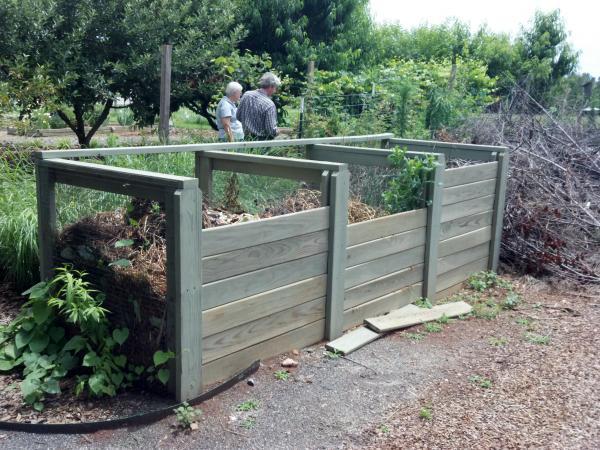Backyard Composting
go.ncsu.edu/readext?797011
en Español / em Português
El inglés es el idioma de control de esta página. En la medida en que haya algún conflicto entre la traducción al inglés y la traducción, el inglés prevalece.
Al hacer clic en el enlace de traducción se activa un servicio de traducción gratuito para convertir la página al español. Al igual que con cualquier traducción por Internet, la conversión no es sensible al contexto y puede que no traduzca el texto en su significado original. NC State Extension no garantiza la exactitud del texto traducido. Por favor, tenga en cuenta que algunas aplicaciones y/o servicios pueden no funcionar como se espera cuando se traducen.
Português
Inglês é o idioma de controle desta página. Na medida que haja algum conflito entre o texto original em Inglês e a tradução, o Inglês prevalece.
Ao clicar no link de tradução, um serviço gratuito de tradução será ativado para converter a página para o Português. Como em qualquer tradução pela internet, a conversão não é sensivel ao contexto e pode não ocorrer a tradução para o significado orginal. O serviço de Extensão da Carolina do Norte (NC State Extension) não garante a exatidão do texto traduzido. Por favor, observe que algumas funções ou serviços podem não funcionar como esperado após a tradução.
English
English is the controlling language of this page. To the extent there is any conflict between the English text and the translation, English controls.
Clicking on the translation link activates a free translation service to convert the page to Spanish. As with any Internet translation, the conversion is not context-sensitive and may not translate the text to its original meaning. NC State Extension does not guarantee the accuracy of the translated text. Please note that some applications and/or services may not function as expected when translated.
Collapse ▲As we clean up our gardens and landscapes this fall, there is probably a lot of yard waste that we are wondering if we could recycle back into our gardens. Composting is a great way to reduce yard waste by recycling them into organic matter to use in gardens, landscape, and flower beds. When mixed with soil, compost increases the organic matter content, improves drainage, and adds nutrients to the soil. Compost can also be used as a mulch to conserve moisture, control weeds, and reduce erosion.

Composting is a great way to reduce yard waste by recycling them into organic matter to use in gardens, landscape, and flower beds.
First, what is composting? Composting is an efficient way of breaking down organic materials into an end product that is beneficial to soil and plants. Adding yard and garden waste directly to the soil before it is composted is undesirable because the uncomposted material would compete with plant roots for nitrogen as the material starts to breakdown. Composted material added to the soil will reduce the competition for nitrogen because the material has already broken down. Composting allows materials such as leaves and grass clippings to go through a microbial process and be converted into more usable organic material.
When having a compost pile, there are factors that will influence the microbial activity which is necessary for the composting process. Aeration is an important factor in compost piles. Oxygen is need by microbes, so that they can do their job in breaking down material. Compost piles should be turned once or twice a month to provide the necessary oxygen. A compost pile with foul odors is a sign that oxygen is not present. Turning the compost piles will also speed up the decomposition of material. A compost pile that is well mixed will reach higher temperatures and help destroy weed seeds and pathogens.
Adequate moisture is essential for microbial activity in a compost pile. Water compost piles when rainfall is limiting. Enough water should be added to completely moisten the pile, but avoid overwatering. Water so the compost pile is damp but not soggy.
The size of material being added to a compost pile will influence the time it takes for compost to be ready to use. Smaller material will break down faster than larger material. For large brush and sticks, use a shredder to reduce the size of material before putting it in the compost pile.
Many organic materials are suitable for composting. Yard waste such as leaves, grass clippings, straw and nonwoody plant trimming can be composted. Grass clippings can also be composted. Kitchen waste such as vegetable scrapes, coffee grounds, and eggshells can be added to a compost pile. Remember to keep a mixture of materials and not all of just one type so you keep a good carbon to nitrogen ratio and the material will break down faster. Some materials to avoid in a compost pile would be any pet feces, meat, bones, grease, whole eggs, or dairy products. These materials should not be added to a compost pile because they can cause diseases or attract rodents.
Having a backyard compost bin or pile is a great way to recycle yard waste and kitchen waste to form a good organic material that can then be incorporated into the soil of gardens and landscape beds.
Jessica Strickland is an agriculture extension agent, specializing in horticulture for North Carolina Cooperative Extension in Wayne County.
Learn More!
- Sign up for the Wayne County Extension Gardening email list to receive timely gardening tips.
- Learn more by following us on Facebook and Instagram




